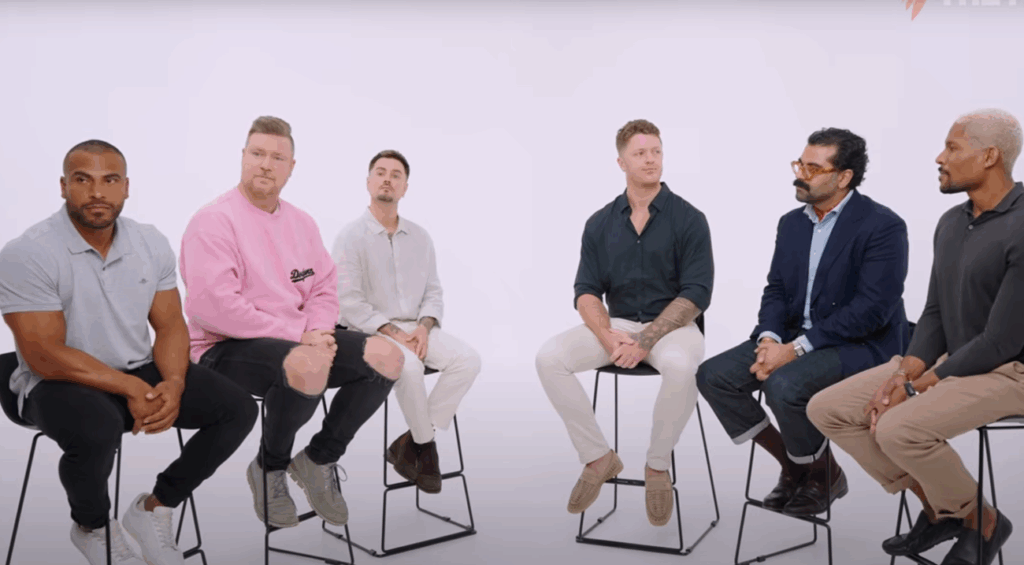SBS’s decision to air a segment of The Feed elevating conservative male influencers who peddle misogyny isn’t just a lapse in judgment, it’s a dangerous failure of public broadcasting responsibility.
In a country where one woman is killed every 10 days by a current or former partner, where adolescent boys are increasingly radicalised online, and where educators, parents, and policymakers are scrambling to undo the damage of violent digital subcultures, this is not a moment for moral ambivalence. It is not a moment to “both sides” gender-based hate.
This is not journalism. This is platforming.
And men don’t need platforming – they are still more likely to be in parliament, more likely to hold leadership positions in business and in the media. Men already control the narrative of masculinity, and that narrative is one of power and violence. Despite the best efforts of Tarang Chawla and Jeff Kissubi, this narrative wasn’t interrupted during the segment, it was reinforced.
Dean Wells, a reality TV contestant turned podcast provocateur, offered nothing but tired “free speech” bluster and grievance-fuelled nonsense about the “over-feminisation” of the world and of men. Clayton Harrop, a self-styled “trauma and relationship coach” with no recognised qualifications, used his airtime to sell purity culture and shame women with a pseudo-therapeutic spin. It’s clear that these men do not like women.
These aren’t illuminating insights into the modern man. They’re content strategies.
We’re not being offered a spectrum of ideas of how to reduce ever growing rates of violence against women, or even to address the crisis of men’s mental health. Instead, we’re being served a house of mirrors where all men are described as instinctively protective, rather than the ones from whom women and children (and other men) usually need protecting.
One where misogyny is repackaged as honesty, and opinions with no evidence base are given the same platform as years of advocacy, research, and community engagement.
We don’t need airtime for men who tell women they need to dress more respectfully, or that they are worth less the more sexual partners they have. We need people like Tarang Chawla, who walks the talk, listens before he speaks, and shows boys and men how to grow and connect without harming themselves or others in the process.
Let’s be clear: Tarang Chawla brought depth, compassion, and evidence-based insight. Jeff Kissubi brought vulnerability, self-expression, and a refreshing take on masculinity unshackled from dominance. Their contributions were thoughtful, constructive, and deeply needed. These men were trying to use their platform to change the narrative.
But platforming men like Wells and Harrop undermined the credibility of the entire episode. Their views weren’t edgy or new, they were predictable. A regurgitation of control disguised as purpose and patriarchy rebranded as personal preference.
And we’ve seen these ideas before. In fact, they’re alarmingly common.
According to the 2021 National Community Attitudes towards Violence Against Women Survey (NCAS) by ANROWS:
- 1 in 3 Australians believe it’s natural for a man to want to be in control of his partner.
- 42 per cent believe women often make up or exaggerate claims of abuse.
- And young men are increasingly aligning with attitudes that downplay or excuse violence and disrespect.
The idea that men are better than women isn’t a fringe belief. It’s embedded in our culture, and when amplified with little critique on national platforms, it doesn’t just reflect the problem. It makes it worse.
That’s why organisations like The Man Cave are so vital. They engage directly with boys in schools, equipping them with the tools to unpack masculinity, challenge peer pressure, and foster emotional intelligence. Their approach is evidence-based, trauma-informed, and grounded in care. They don’t sell manhood as status, they support boys to define themselves through connection, empathy, and self-awareness.
That’s the conversation we need. Not a content strategy dressed up as a national debate.
When SBS gives airtime to creators who mock consent, belittle survivors, and sell masculinity as dominance, it sends a clear message: these views have a place in our social fabric.
They do not.
No amount of clever editing or disclaimers can erase the harm done when institutions legitimise voices that thrive on disinformation, degradation, and division. This is not about censorship it’s about upholding standards and respecting the men and women who work tirelessly to change the narratives of masculinity and respond to its harms. It’s about the duty of a publicly funded broadcaster to avoid amplifying the same toxic pipelines our educators, service providers, victim-survivors and frontline responders are battling daily.
This platforming isn’t provocative. It’s dangerous.
Public broadcasters have a responsibility. Not to appease all perspectives, but to elevate those that are informed, constructive, and safe. The voices of Tarang Chawla, Jeff Kissubi, and organisations like The Man Cave are doing the work. And they shouldn’t have to share airtime with those whose only qualification is a ring light and a following.
This isn’t balance. It’s a distortion chamber. SBS must do better, because Australia deserves better.
Become a Women’s Agenda Foundation member and support our work! We are 100% independent and women-owned. Every day, we cover the news from a women’s perspective, advocating for women’s safety, economic security, health and opportunities. Foundation memberships are currently just $5 a month.
Bonus: you’ll receive our weekly editor’s wrap of the key stories to know every Saturday.


